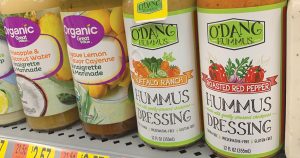The Supply Side: First hummus dressing to land on Walmart shelves
by February 6, 2019 10:36 am 1,443 views

Jesse Wolfe, CEO and founder of O’Dang Hummus, is a foodie at heart, but he stumbled into the food manufacturing business somewhat unconventionally. Several years ago while in college, Wolfe said he was craving Buffalo chicken, but he had just had dental surgery and couldn’t eat the real thing.
“I thought it would be great if I could find some hummus flavored like Buffalo, but it didn’t exist,” Wolfe recalled. “So I set out to make it myself. Later that spring I took a business class that required I write a business plan. I took my idea and put it on paper. I noticed one or two companies had nearly 90% of the market share in that category.”
Wolfe said he began experimenting with different flavors of his homemade hummus to suit a wide array of tastes, which included flavors not already on the market.
“I set out to be the Ben & Jerry’s of hummus,” Wolfe said.
He began peddling his hummus dips at farmers markets across Orlando, Fla. He said there was a long waiting list, which he didn’t expect, but once he got set up as a vendor, the product sold like crazy, emptying his supply in about an hour.
“The farmers market directors told me the average vendor could make $350,000 a year,” Wolfe said. “That was a huge eye-opener for me. During my time selling at the markets, I met a guy who was setting up a food venture capital firm in Orlando — Keen Growth Capital —and I began talking with him about how I might scale the operation into brick-and-mortar retail when the time was right.”
O’Dang operates a small manufacturing facility in Orlando and sources all of its product ingredients from contract farmers. The chickpeas come from California, and the honey is harvested in Orlando. Wolfe said he took great care and pride in choosing the contract growers who supply the raw materials for his products. He said O’Dang will never sacrifice quality, no matter how big an order from a retailer.
Shortly after graduating in 2015, Wolfe was able to appear on ABC’s “Shark Tank” with his hummus products, and he said that helped spread the word well beyond Florida, as he was already selling in regional stores like Publix. Wolfe said O’Dang became known as the hummus guys with the crazy flavors from Orlando.

“I was still so green. I didn’t know anything about serving retail. So we partnered with a deli meat house in Winter Park [Fla.] who helped to mentor us,” Wolfe said. “They took the biggest brands out of their store and gave us a shot. We messed up QR codes, we didn’t know how to pack in cases or how to best deliver. They took care of us anyway.”
Wolfe said 2016 was “crazy” for the young company as it began to scale into 400 stores in the Orlando region. By 2017, Wolfe said he wanted to make O’Dang a national brand. He heard about Walmart’s annual Open Call to suppliers that spring and submitted an email to try and meet with a buyer.
“I was dumbfounded when Walmart contacted me back and gave me an appointment time,” Wolfe said. “I worked with Keen Growth Capital to help me prepare for the Walmart meeting. They set me up with a broker to help me navigate the process. I came to Bentonville and left with a green card to do business.”
PIVOT TO DRESSING
Because hummus is a refrigerated item, Wolfe also pitched his hummus salad dressings to the Walmart buyer. The product was a first of its kind in the category, and Wolfe had only been experimenting with it himself because he wanted it for personal use.
“I am a big guy and trying to be more health-conscious [and] eat a lot of salads,” he said. “But I began noticing the oil-based dressings add so many calories to the salad that I might as well have been eating a cheeseburger. I noticed there were lots of preservatives in the products as well, so I began putting hummus on my salads. The problem was that it was thick and kind of balled up.”
Wolfe said Walmart worked exclusively with O’Dang to help develop the hummus dressing sold in stores today. He said all the product is made in his plant in Orlando, which was retooled for dressing only at the expense of the hummus dip.
“I worked closely with the Walmart buyer who knows the category inside out,” he said. “I developed six flavor profiles and worked to keep a clean ingredient deck of ‘all natural,’ and we got the calorie count down. It allows users to put vegetables on their salad, not oil.”
The price at Walmart is $3.48, a good bit more expensive than the private brand “organic” product sitting next to it on Walmart’s shelf. Wolfe said his product is the only hummus dressing on the shelf, and he worked hard to get that price down from roughly $7 where it started. He said there is not an alternative, as the other brands are

oil based.
He said Walmart originally wanted to test the product in 250 stores but then changed that to 2,500 stores by early February 2018. Because Walmart increased the size of their order, Wolfe was able to scale the business and get the price lower and more in line with other premium salad dressing brands.
“I had to focus all my energies on the new product,” Wolfe said. “I kept my same suppliers, which has been somewhat tricky given how fast Walmart grew my business. For instance, I had to go to my honey suppliers in Orlando and tell them I was going to need 7,000 gallons, a lot more than 100 gallons I had been ordering. The same was true for my chickpea growers in California. My suppliers have been able to grow with me.”
The tight deadline Walmart gave for the first shipment to 2,500 stores was challenging on all fronts, Wolfe said.
“We pulled together and did it,” he said. “Walmart took all six of my flavors. Some stores carry all six, other stores may only carry two or three. The product is selling well. We are not selling any hummus dips at this time, but we’re working with lots of the same retailers who now carry the hummus dressing. We are in roughly 5,500 total U.S. stores and working to get into Costco and HEB as well.”
Looking ahead, Wolfe said he’s excited about some new dip products in the works, with help and insights from Walmart.
“I can’t say enough about how instrumental Walmart has been in helping me scale my business,” he said. “I could not have done it without the support from my Keen partners as well. I love Walmart’s support of American-made, small-business manufacturing initiatives and feel proud to be chosen to participate.”
Growing up in Ohio, Wolfe said his father once worked for Walmart and opened a distribution center for the retail giant. After high school, Wolfe said he wanted to go to culinary school, but his dad told him that was something he could do after graduating college.
Today, O’Dang employs 150 people and 15 others on an executive sales team.
EDITOR’S NOTE: The Supply Side section of Talk Business & Politics focuses on the companies, organizations, issues and individuals engaged in providing products and services to retailers. The Supply Side is managed by Talk Business & Politics and sponsored by Propak Logistics.
